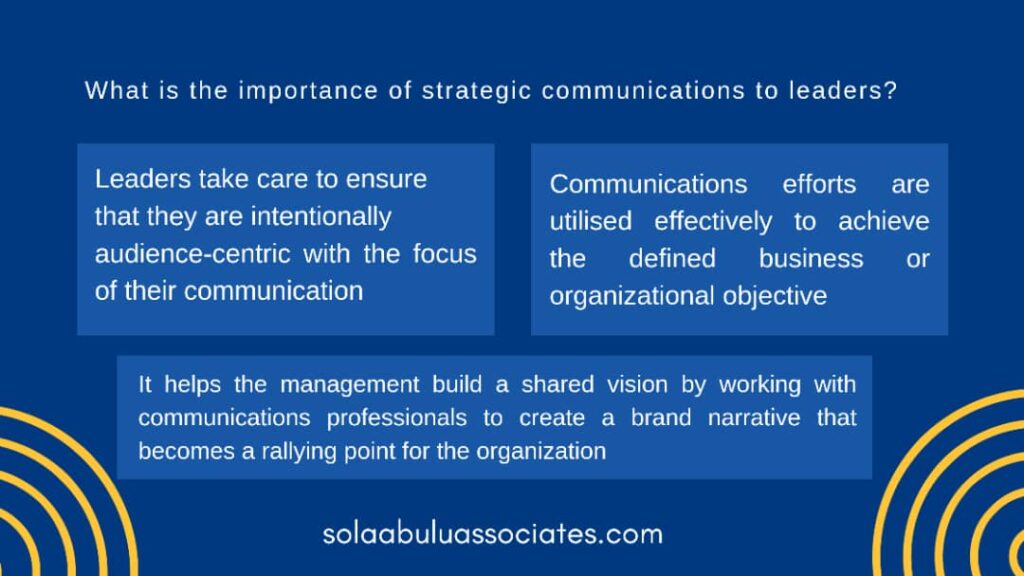What is the importance of strategic communications to leaders?

The concept of strategic communication emphasizes the need to be purposeful and intentional about how you communicate. It is a management approach that enables the achievement of desired outcomes through a premeditated use of communication. The starting point of a communications strategy is the business or organizational imperative. What is the business trying to achieve at that point in time? Or what is the most common problem at hand? Does the brand have an aim to sell a product or service or is it in existence for another purpose? Some of these objectives can include, the need to transform the organization’s workflow processes, increase profitability, etc. The current reality of the business or organization should be the structure from which communications objectives are derived.
When objectives are defined, they can be communicated to the target audience in a targeted and accessible manner. For the communications team to tell the brand story effectively, they must properly assimilate the business imperative as well as the brand’s objectives. A communications effort is not strategic if it does not enable the achievement of desired business outcomes. It is not enough for the strategy to be aligned. It must be business-enabling on a fundamental level. Communication must be one of the ways in which the business purposes to achieve its productivity, profitability and strategic objectives. The ability to communicate business goals and strategy to your team is therefore important in leadership communication as it enables the cultivation of a shared vision, drives integrated delivery and contributes to the growth of any business or organization.

The overall aim of strategic communications as a leadership priority is to ensure that communication efforts are utilized effectively to achieve the defined business or organizational objective. A leader who understands the value of strategic communications deploys or enables an audience-centric approach in decision-making and guides the team in cascading/interpreting the business strategy through communications (usually with the help of a professional and highly skilled internal communications specialist and team).
Being strategic in your communication means that one does not make assumptions about the audience. And leaders take care to ensure that they are intentionally audience-centric with the focus of their communication. They take the trouble to understand what the audience needs to hear and balance it with what they want to say. A strategic approach to communication balances what you want to say with what the audience needs to hear. It strives for a win-win approach. However, a non-strategic or tactical approach will focus only on what the leadership wants to say and will overlook the importance of managing audience expectations or responding to critical issues or addressing the already expressed concerns.
Communication always involves someone other than the self. It is the existence of an “other party” that gives communication life – or a reason to exist. listening is therefore an important pre-requisite for communications. You can only communicate effectively with an audience you know and understand. ~Sola Abulu.
Read the full article here to learn the importance of listening in communications.
Strategic communication is useful for all leadership roles . For example, the management of an institution can build a shared vision by working with communications professionals to create a brand narrative that becomes a rallying point for the organization and business entity and enables it to achieve desired outcomes. Strategic communications expertise is relevant not just to the communications team but the leaders of brands who should own a unique and visible voice that supports the sales/marketing efforts and reputation of the brand. And provide the business strategy intent and lens that enables the communications experts to develop a communications roadmap that is in sync with the overall objective of the business, factors in its unique context and is designed to create space and support for the business through effective brand, stakeholder and reputation management.
In addition to developing the corporate brand voice through an effective use of communication, leaders can also develop their personal brand voice by demonstrating thought leadership and speaking on issues that they are passionate about in alignment with the overall corporate brand strategy. This provides a human face to the brand and enables brand familiarity and loyalty. This is why people all over the world know Steve Jobs as well as they know Apple products in the competitive technology market because he has been able to share the objectives and message of his brand not only with his internal team but the general public also.
For business/organizational leaders looking to learn the frameworks of strategic communications, our training arm is running the 4th virtual cohort of our Strategic Communications course this September. Register your interest here. Promotional discounts for the 4th cohort are ongoing from now till September 16. Enrolment ends by midnight on Sept 24, 2024. (30% discount ends on Sep 8, 2024).
………………………………………………….
Sola Abulu & Associates is a strategy and communications consulting and training firm committed to enabling businesses, brands and organizations to achieve their objectives through strategic communications, organizational effectiveness and reputation risk management
Chat with us for more information on our courses
